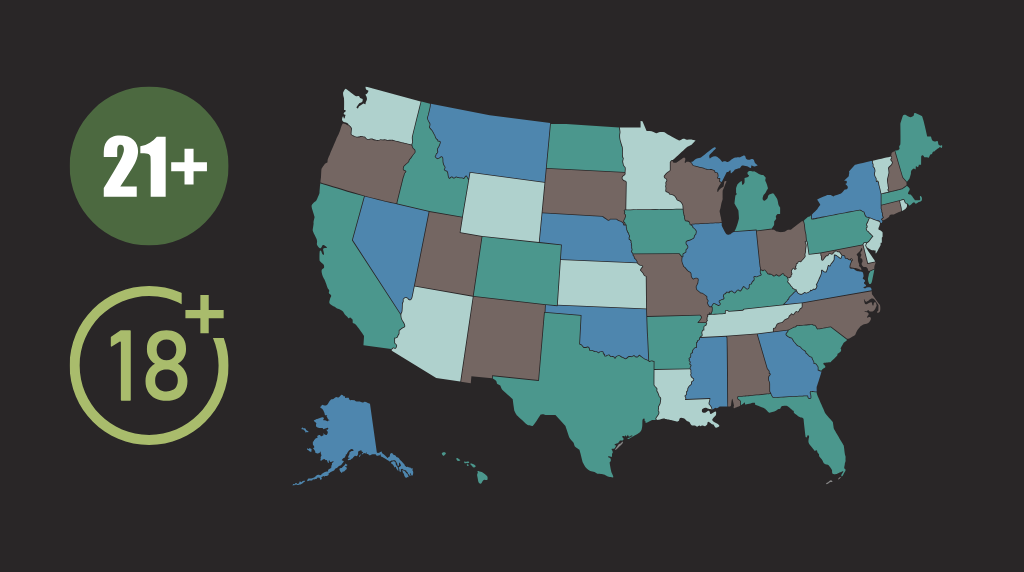This is How and Why States Pick Certain Legal Gambling Ages
Gambling laws in the United States vary significantly from state to state, particularly when it comes to the legal gambling age. This is especially true for different forms of gambling, including casinos, sports betting, and lottery games.

Map of the U.S. with sample ages for legal gambling. Image created by Dan Holmes, Boone Digital
With the rise of online gambling, understanding the online gambling age by state has become increasingly important for players who want to stay compliant with local laws. This article explores the gambling age by state, covering both land-based and online options, to help players navigate the complexities of legal gambling in the U.S.
The Legal Gambling Age in the U.S.
The legal gambling age in the United States generally falls into two categories: 18 and 21. Most states require individuals to be at least 21 years old to enter casinos and engage in various forms of betting, while others allow gambling at 18 under specific conditions. The differences often depend on the type of gambling activity and whether the venue serves alcohol.
For example, in states like Nevada and New Jersey, where casino gambling is a major industry, the minimum age is 21. However, in places like Montana and Rhode Island, individuals as young as 18 can legally place bets in certain gambling establishments.
Online Gambling Age by State
With the rise of internet-based gaming, understanding the online gambling age by state has become more critical than ever. Online gambling laws often follow similar rules to land-based gambling, but certain states have specific regulations that differ for digital platforms.
For instance, states like Pennsylvania and Michigan allow online casino gambling but require players to be at least 21 years old. Meanwhile, in states where online gambling is less regulated, the online casino age might differ, depending on the type of games available and the governing authorities.
Gambling Age by State: A Breakdown
To provide a clear picture, here’s a general overview of gambling age by state for various forms of betting:
- 21+ States: Massachusetts, Nevada, New Jersey, North Carolina, Pennsylvania, Michigan, New York, Ohio, Louisiana, Rhode Island, and Mississippi require players to be at least 21 years old for casino gambling, both online and offline
- 18+ States: Oklahoma, Montana, Minnesota, and Washington allow individuals to gamble in specific settings at 18. Each of those states permit casino gaming at 18.
- Varied States: Some states, like California and Minnesota, permit certain gambling activities at 18 (such as tribal gaming or poker) while restricting commercial casino gaming to those 21 and older (Minnesota).
Each state also regulates the online gambling age differently, which means players must verify local laws before participating in any online betting activities.
Online Casino Age and Its Impact on Players
The online casino age requirement is an essential aspect of digital gambling regulation. States that have legalized online casinos, such as Pennsylvania and New Jersey, enforce a strict minimum age of 21 to protect consumers and maintain responsible gambling practices.
For those interested in playing at US online casinos, it’s essential to verify the legal age requirements and ensure the platform is properly licensed by the respective state gaming commission. Players who fail to adhere to these laws could face penalties or have their accounts restricted.
Differences in Legal Gambling Age for Different Games
The legal gambling age can also differ based on the type of game being played. Below is a breakdown of common gambling activities and their age requirements across various states:
- Casinos (Land-Based & Online): Typically 21, but some states permit 18+ for tribal casinos.
- Lottery: Usually 18 in most states.
- Sports Betting: States like Nevada and New Jersey require bettors to be 21, but some states allow 18+.
- Poker: Online and land-based poker games often follow the casino age requirement in their respective states.
- Roulette: Players looking to play roulette online should confirm the legal age in their state before engaging in real-money gaming.
Why Age Restrictions Matter in Gambling
Legal gambling age regulations exist to protect younger individuals from the risks associated with gambling addiction and financial irresponsibility.
Research has shown that early exposure to gambling can increase the likelihood of developing problematic gambling habits later in life.
By enforcing strict age requirements, states aim to encourage responsible gambling behavior and prevent underage individuals from participating in potentially harmful activities.
How to Verify Your Eligibility
Before signing up for any gambling platform, whether online or land-based, it’s important to:
- Check Your State’s Laws: Use official state gaming commission websites to confirm the gambling age by state.
- Verify Age Requirements on Gambling Platforms: Legitimate sites require age verification before allowing real-money play.
- Use Licensed and Regulated Sites: Avoid offshore gambling sites that may not adhere to U.S. gambling regulations.
Understanding the legal gambling age and the online gambling age by state is crucial for anyone looking to engage in betting activities in the U.S. Whether playing at US online casinos or visiting a land-based establishment, knowing the age restrictions ensures compliance with state laws and promotes responsible gaming.
Since each state has different regulations regarding the online casino age, players should always verify their eligibility before participating in any form of gambling. Whether you want to visit a casino or play roulette online, always adhere to the legal requirements in your jurisdiction to enjoy a safe and legal gambling experience.
 Reel Love: 5 Slot Games to Match Every Valentine’s Mood
Reel Love: 5 Slot Games to Match Every Valentine’s Mood
 Best Christmas Slots for 2025
Best Christmas Slots for 2025
 7 Politically Incorrect Slots for the Connoisseur Who’s Seen It All
7 Politically Incorrect Slots for the Connoisseur Who’s Seen It All
 Casino Payment Delay Red Flags: When Waiting Is a Concern
Casino Payment Delay Red Flags: When Waiting Is a Concern